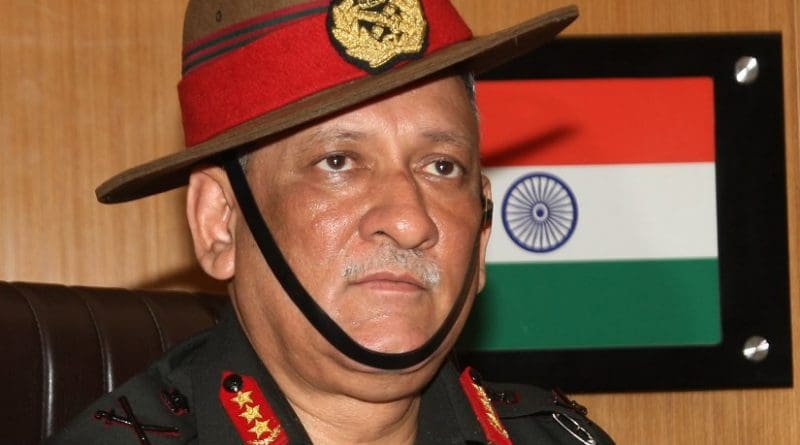India: Brewing Storm In A Teacup – Analysis
By Observer Research Foundation
By Deepak Sinha
On the hotly-debated issue of selection of the Chief of Army Staff, let there be no doubt that hypocrisy and selective use of facts seem to be the norm on both sides of the fence. At the outset, in the 21st century, Service chiefs have been reduced to pygmies by successive Governments over the years. They are no longer the divine entities to the rank and file that they were in the past. Social media and the Internet has put paid to that. Their inability over the years, to either influence policy or ensure that the military is appropriately treated along with blatant acts of partiality and unethical behaviour on the part of some incumbents, has also seen to that.
There are three major issues that have come to the fore in this debate over suitability of a particular individual to hold that appointment. To suggest that this is an issue of merit versus seniority, as some have attempted to do, is a non sequitur, given that all those who reach the rank of Army commander or equivalent after 36 years or so of service, are obviously at par, though each has his own strengths and weaknesses. The difference in seniority and experience is only either in months or just ranking within the batch on commissioning and means little at this rank, except purely in bureaucratic terms.
The most important argument made against supersession of the senior-most candidates is that it may lead to politicising of the military because future Army Commanders, vying to become the chief, may end up cozying the politicians and doing them favours. This argument is self-defeating because if the moral and ethical foundation of our Army Commanders is so shaky, then they have no business to hold such important posts, and the Ministry and service headquarters need to carry out deep soul searching of the existing selection process. That apart, it isn’t as if some officers do not cozy up to politicians or that political influence does not count.
Moreover, politics is not a game that is restricted to politicians only and is undeniably at play within the organisation at higher levels. We should not be surprised to know that in ensuring a ‘line of succession’, based on seniority, subterfuge and subversion are routinely resorted to by the serving incumbent and other senior commanders and bureaucrats in the Ministry. Sudden changes in promotion criteria, delay in conduct or promulgation of selection boards and dishing out of awards, details of which are not easily available in public domain, but clearly known to all within the organisation, clearly points to this unhealthy practice. Supersession upsets the elaborate planning process by introducing a degree of uncertainty, disliked by all participants of this game.
There is an element of farce in the argument being made to rubbish the Government’s apparent partiality to the fact that the officer selected has comparatively more experience in counter-insurgency at the ground level than those senior to him and the fact that this aspect has been given over-riding importance. It is being suggested that we are playing into Pakistan’s hands because we are giving undue importance to the proxy war that it is waging in Jammu & Kashmir and ruling out offensive operations in the plains and deserts in any future conflict.
The truth, whether we wish to accept it or not, is that given the nuclear capabilities of our adversary, conventional war is an undesirable venture and we have very limited options in the heartland of Punjab, despite our very potent capability to implement the ‘Cold Start’ doctrine that has been enunciated. Unless circumstances otherwise dictate, no mature political leader will ever approve plans that push the dagger into the heart of Pakistan and could, therefore, lead to an escalation of conflict into the nuclear realm, however unlikely that may be.
In our context, the Line of Control is where any future conflict is likely to be restricted to, and we have little choice but to robustly counter Pakistan’s proxy war in that theatre through force and other means. Also, given China’s ever increasing attempts at dominating the region, the mountains and those with the experience, ground knowledge and skill-sets to fight in that terrain have become increasingly important and occupy crucial positions within the hierarchy. Similarly, there was a time, a few decades ago, when the plains and desert sectors were of immense importance and our forces were biased towards conduct of mechanised warfare.
Consequently, those with the requisite expertise, had the edge when it came to selection for higher ranks. The fact is more than any element of bias or partiality, time and circumstances appear to have played a crucial role in selection of the chief and politicisation of the issue is best avoided. We must not forget that the previous regime too had superseded a flag officer while appointing Admiral Robin K Dhowan as the last Naval chief for reasons that it felt were indisputable.
Having said this, it appears that the present Modi Government has missed an ideal opportunity to have set in motion the restructuring of our defence establishment by appointing a Chief of Defence Staff or Chairman Joint Chiefs of Staff. This has become a dire necessity and cannot be delayed or wished away without deleterious consequences to our national security establishment and environment. By appointing the senior most to that post, much of this present controversy could have been avoided or side-stepped, which would have been to everybody’s benefit. One can only hope that better sense prevails and it does so even at this belated stage.
This article originally appeared in The Pioneer.

